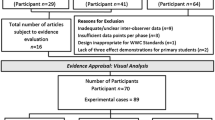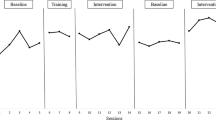Abstract
The effectiveness of an intervention package involving self-management and a group contingency at increasing appropriate classroom behaviors was evaluated in a sample of middle school students. Participants included all students in each of the 3 eighth-grade general education classrooms and their teachers. The intervention package included strategies recommended as part of best practice in classroom management to involve both building skill (self-management) and reinforcing appropriate behavior (group contingency). Data sources involved assessment of targeted behaviors using Direct Behavior Rating—single item scales completed by students and systematic direct observations completed by external observers. Outcomes suggested that, on average, student behavior moderately improved during intervention as compared to baseline when examining observational data for off-task behavior. Results for Direct Behavior Rating data were not as pronounced across all targets and classrooms in suggesting improvement for students. Limitations and future directions, along with implications for school-based practitioners working in middle school general education settings, are discussed.



Similar content being viewed by others
References
Briesch, A. M., & Chafouleas, S. M. (2009). Review and analysis of literature on self-management interventions to promote appropriate classroom behaviors (1988–2008). School Psychology Quarterly, 24, 106–118.
Briesch, A. M., Chafouleas, S. M., & Riley-Tillman, T. C. (2010). Generalizability and dependability of behavior assessment methods to estimate academic engagement: A comparison of systematic direct observation and direct behavior rating. School Psychology Review, 34, 408–421.
Chafouleas, S. M., Riley-Tillman, T. C., & McDougal, J. (2002). Good, bad, or in-between: How does the daily behavior report card rate? Psychology in the Schools, 39, 157–169.
Chafouleas, S. M., Riley-Tillman, T. C., Sassu, K. A., LaFrance, M. J., & Patwa, S. S. (2007a). Daily behavior report cards (DBRCs): An investigation of consistency of on-task data across raters and method. Journal of Positive Behavior Interventions, 9, 30–37.
Chafouleas, S. M., Riley-Tillman, T. C., & Sugai, G. (2007b). School-based behavioral assessment: Informing instruction and intervention. New York: Guilford.
Chafouleas, S. M., Briesch, A. M., Riley-Tillman, T. C., & McCoach, D. B. (2009a). Moving beyond assessment of treatment acceptability: An examination of the factor structure of the Usage Rating Profile—Intervention (URP-I). School Psychology Quarterly, 24, 36–47.
Chafouleas, S. M., Kilgus, S. P., & Hernandez, P. (2009b). Using Direct Behavior Rating (DBR) to screen for school social risk: A preliminary comparison of methods in a kindergarten sample. Assessment for Effective Intervention, 34, 214–223.
Chafouleas, S. M., Riley-Tillman, T. C., & Christ, T. J. (2009c). Direct Behavior Rating (DBR): An emerging method for assessing social behavior within a tiered intervention system. Assessment for Effective Intervention, 34, 195–200.
Chafouleas, S. M., Briesch, A. M., Riley-Tillman, T. C., Christ, T. C., Black, A. C., & Kilgus, S. P. (2010a). An investigation of the generalizability and dependability of direct behavior rating single item scales (DBR-SIS) to measure academic engagement and disruptive behavior of middle school students. Journal of School Psychology, 48, 219–246.
Chafouleas, S. M., Volpe, R. J., Gresham, F. M., & Cook, C. (2010b). School-based behavioral assessment within problem-solving models: Current status and future directions. School Psychology Review, 34, 343–349.
Chafouleas, S. M., Sanetti, L. M. H., Kilgus, S. P., & Maggin, D. M. (in press). Evaluating sensitivity to behavioral change across consultation cases using direct behavior rating single-item scales (DBR-SIS). Exceptional Children.
Christ, T. J., & Christ, J. A. (2006). Application of an interdependent group contingency mediated by an automated feedback device: An intervention across three high school classrooms. School Psychology Review, 35, 78–90.
Dalton, T. D., Martella, R. C., & Marchand-Martella, N. E. (1999). The effects of a self-management program in reducing off-task behavior. Journal of Behavioral Education, 9, 157–176.
Epstein, M., Atkins, M., Cullinan, D., Kutash, K., & Weaver, R. (2008). Reducing behavior problems in the elementary school classroom: A practice guide (NCEE #2008-012). Washington, DC: National Center for Education Evaluation and Regional Assistance, Institute of Education Sciences, U.S. Department of Education. Retrieved from http://ies.ed.gov/ncee/wwc/publications/practiceguides.
Hintze, J. M., & Matthews, W. J. (2004). The generalizability of systematic direct observation across time and setting: A preliminary investigation of the psychometrics of behavioral observation. School Psychology Review, 33, 258–270.
Kehle, T. J., Bray, M. A., & Theodore, L. A. (2000). A multi-component intervention designed to reduce disruptive classroom behavior. Psychology in the Schools, 37, 475–481.
Kratochwill, T. R. (2007). Preparing psychologists for evidence-based school practice: Lessons learned and challenges ahead. American Psychologist, 62, 829–842.
Kratochwill, T. R., Clements, M. A., & Kalymon, K. M. (2007). Response to intervention: Conceptual and methodological issues in implementation. In S. R. Jimerson, M. K. Burns, & A. M. VanDerHeyden (Eds.), The handbook of response to intervention: The science and practice of assessment and intervention (pp. 22–52). New York: Springer.
Kratochwill, T. R., Hitchcock, J., Horner, R. H., Levin, J. R., Odom, S. L. Rindskopf, D. M., & Shadish, W. R. (2010). Single-case designs technical documentation. Retrieved from What Works Clearinghouse, https://ies.ed.gov/ncee/wwc/pdf/wwc_scd.pdf.
Lentz, F. E., Allen, S. J., & Ehrhardt, K. E. (1996). The conceptual elements of strong interventions in school settings. School Psychology Quarterly, 11, 118–136.
Lipsey, M. W., & Wilson, D. B. (1993). The efficacy of psychological, educational, and behavioral treatment: Confirmation from meta-analysis. American Psychologist, 48, 1181–1209.
Litow, L., & Pomroy, D. K. (1975). A brief review of classroom group-oriented contingencies. Journal of Applied Behavior Analysis, 8, 341–347.
Noell, G. H. (2009). Empirical and pragmatic issues in assessing and supporting intervention implementation in schools. In G. G. Peacock, R. A. Ervin, E. J. Daly, & K. W. Merrell (Eds.), Practical handbook of school psychology: Effective practices for the 21st century (pp. 513–530). New York: The Guilford Press.
Riley-Tillman, T. C., & Burns, M. K. (2009). Evaluating educational interventions: Single-case design for measuring response to intervention. New York: The Guilford Press.
Riley-Tillman, T. C., Chafouleas, S. M., Sassu, K. A., Chanese, J. M., & Glazer, A. D. (2008). Examining agreement between Direct Behavior Ratings (DBRs) and systematic direct observation data for on-task and disruptive behavior. Journal of Positive Behavior Interventions, 10, 136–143.
Riley-Tillman, T. C., Christ, T. J., Chafouleas, S. M., Boice, C. H. & Briesch, A. M. (2010). The impact of observation duration on the accuracy of data obtained from Direct Behavior Rating (DBR). Journal of Positive Behavior Interventions. doi:10.1177/1098300710361954.
Roach, A. T., & Elliott, S. N. (2008). Best practices in facilitating and evaluating intervention integrity. In A. Thomas & J. Grimes (Eds.), Best practices in school psychology (5th ed., Vol. 2, pp. 195–208). Bethesda, MD: The National Association of School Psychologists.
Sanetti, L. M. H., Chafouleas, S. M., Fallon, L. M. & Jaffery, R. (2011). Increasing teachers’ treatment integrity when implementing a class-wide intervention through performance feedback provided by a school-based consultant: A case study. Manuscript submitted for publication.
Saudargas, R. A., & Lentz, F. E. (1986). Estimating percent of time and rate via direct observation: A suggested observational procedure and format. School Psychology Review, 15, 36–48.
Shapiro, E. S. (2011). Academic skills problems: Fourth Edition Workbook. New York: The Guilford Press.
Simonsen, B., Fairbanks, S., Briesch, A. M., Myers, D., & Sugai, G. (2008). Evidence-based practices in classroom management: Considerations for research to practice. Education and Treatment of Children, 31, 351–380.
Stage, S. A., & Quiroz, D. R. (1997). A meta-analysis of interventions to decrease disruptive classroom behavior in public education settings. School Psychology Review, 26, 333–368.
Acknowledgments
Preparation of this article was supported in part by a grant from the Institute for Education Sciences, US Department of Education (R324B060014).
Author information
Authors and Affiliations
Corresponding author
Additional information
Opinions expressed herein do not necessarily reflect the position of the US Department of Education, and such endorsements should not be inferred.
Rights and permissions
About this article
Cite this article
Chafouleas, S.M., Hagermoser Sanetti, L.M., Jaffery, R. et al. An Evaluation of a Classwide Intervention Package Involving Self-Management and a Group Contingency on Classroom Behavior of Middle School Students. J Behav Educ 21, 34–57 (2012). https://doi.org/10.1007/s10864-011-9135-8
Published:
Issue Date:
DOI: https://doi.org/10.1007/s10864-011-9135-8




